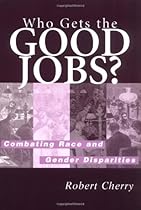Read Who Gets the Good Jobs?: Combating Race and Gender Disparities by Robert Cherry Online
Read [Robert Cherry Book] ! Who Gets the Good Jobs?: Combating Race and Gender Disparities Online * PDF eBook or Kindle ePUB free. Who Gets the Good Jobs?: Combating Race and Gender Disparities Accessible, informative and well-documented - excellent. It's a pity the title suggests a self-help book on tacking the job market. _Who Gets the Good Jobs_ is a very readable, well-documented discussion of what we all know--that discrimination in employment is alive and well, and that neither conservative denial nor orthodox leftist ideologies, will remedy it.. "This is the review I wrote for Choice (the ALA's mag):" according to Joyce Jacobsen. Cherry proposes a middle ground between the view

| Title | : | Who Gets the Good Jobs?: Combating Race and Gender Disparities |
| Author | : | |
| Rating | : | 4.37 (534 Votes) |
| Asin | : | 0813529212 |
| Format Type | : | paperback |
| Number of Pages | : | 256 Pages |
| Publish Date | : | 2017-09-22 |
| Language | : | English |
Accessible, informative and well-documented - excellent. It's a pity the title suggests a self-help book on tacking the job market. _Who Gets the Good Jobs_ is a very readable, well-documented discussion of what we all know--that discrimination in employment is alive and well, and that neither conservative denial nor orthodox leftist ideologies, will remedy it.. "This is the review I wrote for Choice (the ALA's mag):" according to Joyce Jacobsen. Cherry proposes a middle ground between the view that capitalism reduces discriminatory practices and the position that capitalism benefits from, or at least can coexist with, discriminatory practices. He stresses the relevance of both theory and historical context for comprehending current levels and patterns of race and gender discrimination. After considering how the profit motive may discipline owners to be nondiscriminatory, Cherry discusses a number of reasons why discrimination might increase--. "Well researched, thoughtful and important" according to Mary King. Robert Cherry has written an impressive and important book on the history and status of economic disparities and policies related to race and gender in the United States. Drawing on years of study, particularly of African American economic progress, Cherry (p. xiii) has "struggled to find compatibility between [his] head and [his] heart," tackling tough, controversial questions forthrightly. In this book Cherry has set himself to assess the source and extent of the economic progress of people of color
In 2000, the U.S. Many conservative economists claim that financial considerations have led businesses to hire minorities because such practices increase profits. Cherry demonstrates how the promotion of full employment can further the advancement of working-class African Americans and women.. In opposition, many liberal economists believe businesses will hire minorities only if forced to do so by equal employment opportunity policies. Robert Cherry bridges these two positions, arguing that there is some truth to the positive effect of the profit motive, but that market forces alone are not enough to eliminate employment and earnings disparities. Cherry surveys the political and economic forces that influenced labor marke
Robert Cherry is Brueklundian Professor in the Department of Economics at Brooklyn College of the City University of New York and author of many books, including Who Gets the Good Jobs: Combating Race and Gender Disparities and Welfare Transformed: Universalizing Family Policies that Work.
Cherry surveys the political and economic forces that influenced labor market practices in the nineteenth and twentieth centuries, focusing on the employment barriers African Americans, women, and immigrants encountered. From the Back Cover Racial and gender employment inequalities are alive and well today. In 2000, the U.S. In opposition, many liberal economists believe businesses will hire minorities only if forced to do so by equal employment opportunity policies. He then assesses the effects of 1960s civil rights legislation and finds that improvements have been substantial, primarily for college-educated African Americans and women; therefore, he recommends that equal employment opportunity policies be strengthened. At the same time, African American employees of Coca-Cola sued thei
Download Who Gets the Good Jobs?: Combating Race and Gender Disparities
Download as PDF : Click Here
Download as DOC : Click Here
Download as RTF : Click Here
